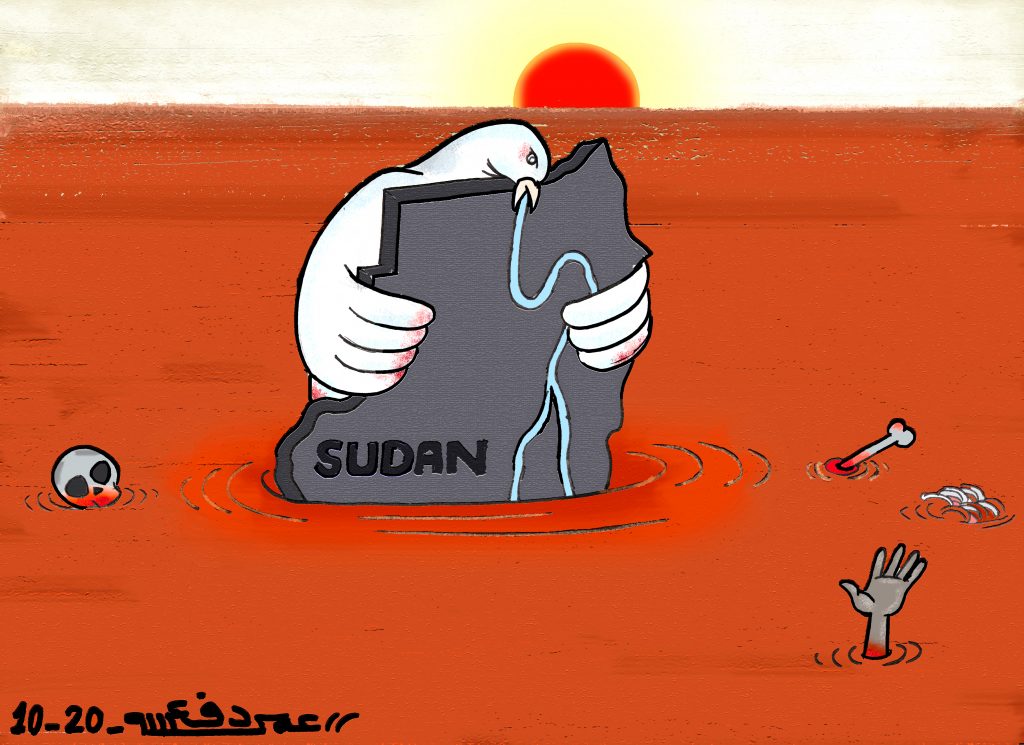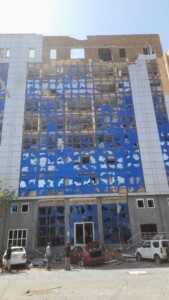Sudan conflict hits 300-day mark

Cartoon by Omar Dafallah (RD)
Almost 10 months have passed since clashes between the Sudanese Armed Forces (SAF) and the paramilitary Rapid Support Forces (RSF) broke out in Khartoum on April 15, 2023. The conflict has since expanded to encompass various regions of the country, killing more than 12,000 people and leading to the world’s largest displacement crisis. Negotiation efforts faltered multiple times, and a ‘military solution’ seems far from feasible, according to analysts.
On the morning of April 15, during the Islamic holy month of Ramadan, residents of Khartoum awoke to the sounds of gunfire and shelling, unleashing a war that has now hit the 300-day mark.
From the beginning, both parties used social media to substantiate their claims against the other. Videos published by the SAF media room showcased RSF units deployed around the Republican Palace in Khartoum on the first day of fighting, accusing them of firing the first shot. The RSF launched campaigns blaming the SAF, remnants of the former regime, Islamic Movement groups, and National Congress Party (NCP) loyalists of starting the violence.
The paramilitary group further asserted that NCP leaders, having escaped from prison, were guiding SAF operations, and has actively promoted a narrative that its aim is to eliminate remnants’ control of power and to restore democracy.
Militarily, the conflict has expanded to include nine of Sudan’s states: Khartoum, North Kordofan, South Kordofan, White Nile, West Darfur, Central Darfur, North Darfur, South Darfur, East Darfur, and parts of Sennar.
The RSF claimed control over many of the SAF military bases in Khartoum, including El Mohandesin (Engineers) Corps and El Shajara Corps, and have repeatedly targeted the Wadi Sedna base in northern Omdurman. It also assumed control of the strategic Jebel Aulia dam in southern Khartoum, SAF garrisons in the South Darfur capital, Nyala, and in El Gezira‘s capital, Wad Madani, and has engaged in skirmishes in El Faw, El Gedaref.
Several armed groups aligned with the SAF, including El Baraa bin Malik Brigade affiliated with the Islamic Movement, the Sudan Liberation Movement factions led by Minni Minawi (SLM-MM) and Mustafa Tambour (SLM-Tambour), and the Sudanese Justice and Equality Movement (JEM), at the time still led by Jibril Ibrahim, declared their support and allegiance to the SAF in a press conference held in Port Sudan in November.
Negotiation efforts
An initiative to resolve the war, dubbed the Jeddah Platform, was jointly launched by the Kingdom of Saudi Arabia and the United States of America in May 2023.
Several rounds of discussions ensued, during which both parties announced their commitment to a ceasefire on multiple occasions, albeit without full adherence. The Jeddah Declaration, which was signed following the first round of discussions, on May 11, encompassed key principles, including:
- Emphasising the necessity of allowing safe passage for humanitarian workers, and streamlining procedures for humanitarian relief operations in Sudan.
- Affirming Sudan’s sovereignty and the preservation of its unity and territorial integrity.
- Prioritising the interests and safety of the Sudanese people.
- Pledging to protect all private and public facilities in Sudan and refraining from using them for military gains.
Negotiations between the SAF and the RSF resumed on October 27, after a hiatus of more than four months. Representatives from the African Union (AU) and the Intergovernmental Authority for Development (IGAD) joined the discussions, aiming to establish confidence-building measures and commitments as precursors to a ceasefire agreement.
However, less than two weeks later, negotiations were suspended by the facilitators, Saudi Arabia and the United States, due to non-compliance by both parties to stipulated agreements in previous rounds.
IGAD proposed mediating an end to the conflict between the SAF and the RSF on multiple occasions, including hosting a direct meeting between the warring generals, to which both sides eventually agreed to, following a rejection by the Sudanese Foreign Ministry.
Additionally, IGAD proposed convening a summit in Uganda to address the Sudanese crisis, a proposition countered by the Sudanese Ministry of Foreign Affairs, asserting there was “no necessity for such a summit”. The commander of the RSF, Mohamed Hamdan ‘Hemedti’ Dagalo, nonetheless accepted an invitation to the summit.
The Sudanese FA then announced Sudan’s decision to suspend its membership in IGAD, conveying a letter from SAF Commander in Chief Abdelfattah El Burhan to the president of Djibouti and the head of IGAD, Ismail Omar Guelleh.
The ministry further condemned IGAD for failing to implement the outcomes of a previous summit in Djibouti, and criticised IGAD for canceling a meeting scheduled for December 28 between the two generals, citing “technical reasons” preventing the attendance of Hemedti, who was concurrently visiting several IGAD countries.
On January 1, the Ethiopian capital, Addis Ababa, hosted a meeting between a delegation from the Coordination of Civil Democratic Forces (better known as Tagaddum) led by former Prime Minister Abdalla Hamdok, and an RSF delegation led by Hemedti.
The RSF and Tagaddum formalised the agreements set during the meeting by signing the Addis Ababa Declaration.
Rasha Awad, spokesperson for Tagaddum, affirmed the coalition was in communication with various Sudanese parties but had “yet to receive responses” from these parties, “except for the RSF, which accepted the invitation and engaged in discussions”.
During a press conference on February 7, United Nations Relief Chief Martin Griffiths disclosed that both parties had agreed to meet, likely in Switzerland, to discuss the delivery of humanitarian aid.
Displacement crisis
Amidst the fighting, cities and villages across Sudan were repeatedly attacked by both sides, resulting in widespread destruction of civilian infrastructure, and the displacement of residents to areas with catastrophic humanitarian conditions, including severe shortages in food supplies and medical aid.
As of date, the war has displaced 10.7 million people, 1.7 million of which fled to neighbouring countries, leading to the “world’s largest displacement crisis” according to the United Nations. In El Gezira alone, fighting forced 300,000 people to flee their homes in search of safety.
Approximately half of Sudan’s population, around 25 million people, urgently require humanitarian assistance and protections.
The United Nations and its partners have issued an appeal for $4.1 billion in 2024 to address the most critical humanitarian needs of civilians within Sudan and those who have sought refuge in neighboring nations.
Civil war
Since the onset of the war, civilians have endured repeated violations, including unlawful detention, and oppressive measures against grassroots movements. Reports of plundering and attacks targeting civilians in El Gezira grew following the RSF takeover of the state late last year. Calls to arm civilians in areas outside conflict zones intensified, with popular arming campaigns garnering support from SAF leadership.
Political analysts warned of the peril of civil war due to widespread weapon distribution among civilians in Sudan. Many fear the consequences of tribal alignment, particularly in Darfur, where heightened ethnic and regional tensions risk fueling hate speech and racism among Sudanese. Statements from state governors targeting residents based on regional and ethnic identities further ignite concerns of a broader civil war in Sudan.











 and then
and then